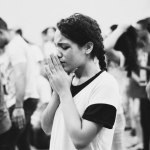March Prayer Partner: What the Cross Means
Dear friends,
On Sunday, like at churches around the world, my family was given palm fronds on the way into church, marking the beginning of Holy Week by remembering Jesus’ entry into Jerusalem on a borrowed donkey.
My kids, mimicking the children in the pew in front of us, began to fashion their palm fronds into crosses, which they waved in the air as we sang songs of Hosanna.
It didn’t take long, however, before my three-year-old, Zach, gripped the short end of the cross and began wielding it as a sword, needling his siblings. How inappropriate, I thought, to turn this sacred symbol into an instrument of violence.
Except, of course, that that’s exactly what a cross was.
It’s strange, if you stop to think about it, that a torture device used to kill in the most barbaric and shameful way has become a symbol adorning jewelry, put on bumper stickers and used to mark buildings as consecrated to God.
Today, as we reflect upon Christ’s crucifixion, it’s worth remembering the profound horror of being killed on a cross, because only when we contemplate it can we come near to understanding the depth of God’s love that sent Him there.
The cross opens the way for our forgiveness and reconciliation back to God. That miraculous story is at the center of the gospel. But that’s not all that happened at Calvary.
Ephesians 2:11-22, one of my favorite passages, reminds us that “through the cross” God not only reconciles both Jew and Gentile individuals to God, he also reconciles people of profoundly different backgrounds to one another, putting “to death their hostility,” destroying the dividing wall that kept them separate and uniting once-feuding groups.
Those of us who were once “separate from Christ, excluded from citizenship… and foreigners to the covenants of the promise, without hope and without God in the world” have become “fellow citizens with God’s people and also members of his household.”
That reconciliation across people groups and naturalization into God’s Kingdom is possible because of Christ’s sacrificial, torturous, violent death. And that’s part of why followers of Jesus around the world — Jews and Gentiles, native-born and immigrants, Black, White, Latino, Asian, Native American, Arab and of every other ethnicity — consider today to be a Good Friday.
I hope you’ll have time to reflect on the meaning of the cross today, and as you do, to pray:
- Thanking God for His love, demonstrated at Calvary, and for the forgiveness of sin that He purchased for us
- For the Church in the United States and around the world to live into the reconciliation that Jesus made possible on the cross
- That those of us who have been naturalized into God’s Kingdom by His grace would also extend grace to others, including those seeking the immeasurably less-valuable status as citizens in this country
- For those who reside in our country or in any country where they are excluded from citizenship, that whether or not governmental policies ever facilitate their ability to naturalize, they would experience the hope of inclusion in God’s Kingdom
In Christ,
Matthew Soerens
National Coordinator, Evangelical Immigration Table





